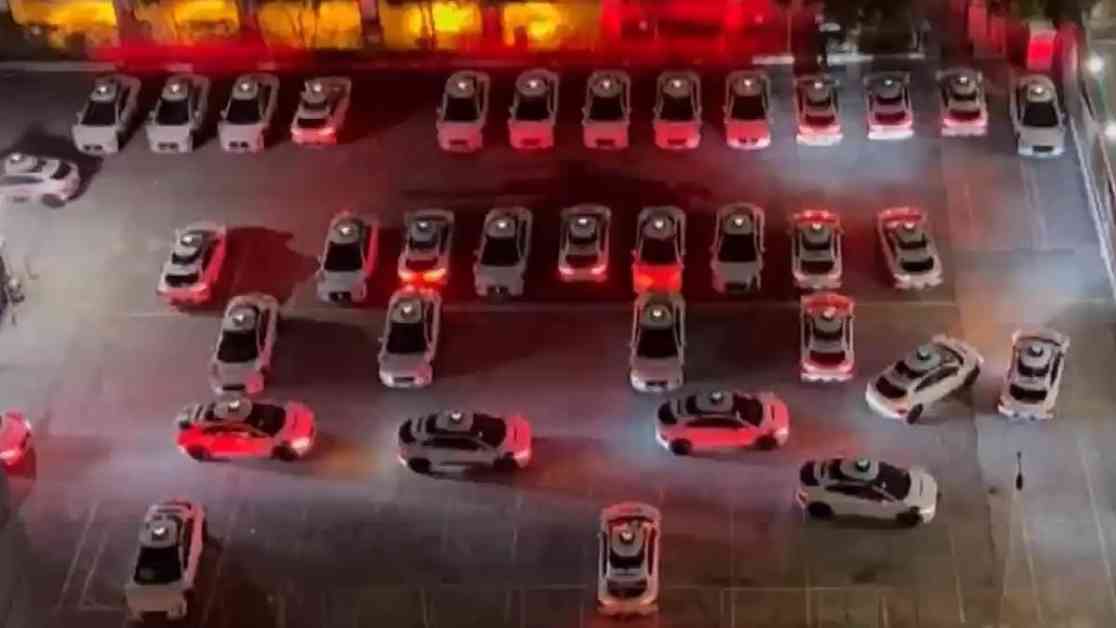Frustrated San Francisco residents in the South of Market neighborhood are facing disrupted sleep and decreased well-being due to a parking lot full of driverless cars that incessantly beep at each other. The constant honking of Waymo vehicles has become a source of annoyance and exhaustion for those living nearby, leading to a growing outcry for a resolution to the issue.
Residents near 2nd Street and Harrison Street have reported hearing the driverless cars honking at all hours of the day, disturbing their peace and causing sleepless nights. The dystopian scene of cars circling the parking lot with their lights on, honking randomly at each other, has become a common sight in the neighborhood. Initially, residents were excited to welcome the robotaxis to the area, but that excitement quickly turned to frustration as the noise started to take its toll on their well-being.
Randol White, a 57-year-old resident, shared his experience of being woken up by the honking at 4 a.m., stating, “At first I actually found it really funny, these cars are honking at each other. I don’t find it funny anymore.” White’s sentiments are echoed by many other residents who have been disturbed by the constant noise emanating from the parking lot. The disruption to their sleep and daily routines has left them feeling helpless and frustrated.
The situation has reached a breaking point for many residents, with some expressing their concerns to the company behind the driverless cars, Waymo. Despite assurances from Waymo that they are aware of the problem and are working on a solution, residents like White feel that their voices are not being heard. The lack of a human presence to address their complaints adds to their sense of helplessness, as they feel like they are “yelling into the void” with no tangible results.
As the honking continues unabated, longtime residents like Russell Pofsky are feeling the impact of the disruption on their mental and emotional well-being. Pofsky shared, “Over the past two weeks I’ve been woken up more times overnight than I have combined over 20 years. It’s really at a high level. It’s just really, really… it’s tough. It affects the way you feel.” The toll that the constant noise is taking on residents is evident, with many struggling to cope with the disruption to their daily lives.
Residents Demand Action
The frustration and exhaustion felt by residents have led to a growing demand for action to be taken to address the issue of the driverless cars’ constant beeping. Christopher Cherry, another resident in the neighborhood, expressed his initial excitement at welcoming Waymo to the area, only to be disappointed by the incessant honking that disrupts his workday and wakes him up in the early hours of the morning. Cherry emphasized the need for the honking to stop, stating, “We love having them there, we just would like for them to stop honking their horn at four in the morning repeatedly.”
Residents have taken to social media and local news outlets to voice their concerns and seek a resolution to the problem. The impact of the constant noise on their sleep, work, and overall well-being has prompted many to call for immediate action to be taken by the company responsible for the driverless cars. As the honking continues to disrupt their lives, residents are growing increasingly frustrated with the lack of a timely and effective solution to the issue.
Waymo’s Response and Efforts to Address the Problem
In response to the mounting complaints from residents, Waymo has acknowledged the issue and stated that they are working on implementing a fix to resolve the problem. The company has recognized that their vehicles may briefly honk while navigating parking lots and has identified the cause of the honking. However, residents are anxious for a swift resolution to the issue, as the constant noise continues to disrupt their daily lives and well-being.
Despite assurances from Waymo that they are actively working on a solution, residents remain skeptical about the timeline for resolving the problem and the effectiveness of the proposed fix. The lack of concrete action to address the honking issue has only fueled residents’ frustration and heightened their sense of helplessness in the face of the ongoing disruption caused by the driverless cars.
As the honking persists and residents’ patience wears thin, the need for a timely and effective solution to the problem becomes increasingly urgent. The impact of the constant noise on residents’ sleep and well-being cannot be understated, and the toll it is taking on their mental and emotional health is becoming more pronounced with each passing day.
In conclusion, the situation in the South of Market neighborhood in San Francisco highlights the unintended consequences of technological advancements such as driverless cars. While the promise of innovation and convenience is appealing, the reality of the disruption and inconvenience caused by the constant honking of these vehicles cannot be ignored. Residents are rightfully demanding a resolution to the issue, and it is imperative that Waymo takes swift and decisive action to address the problem and restore peace and tranquility to the neighborhood.






















